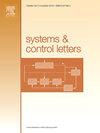Consensus-based distributed estimator of cyber–physical systems against false data injection attacks: A two-layer estimation approach
IF 2.1
3区 计算机科学
Q3 AUTOMATION & CONTROL SYSTEMS
引用次数: 0
Abstract
The problem of consensus-based distributed estimation for cyber–physical systems (CPSs) against false data injection (FDI) attacks is taken into account. Different from most research perspectives, the FDI attack is modeled with high randomness in value, target, and period. The CPSs architecture with a group of sensors and estimators is considered in the distributed estimation. A reconstructed measurement, depending on the combination of an attack detector and estimation results, is established to obtain accurate measurement data when the transmitted measurements are falsified by FDI attacks. The two-layer estimator, which includes measurement fusion estimation and interactive consensus estimation, is advanced to achieve secure consensus-based distributed estimation. In contrast to current approaches, due to accumulating measurement data from different sensors, and adopting the appropriate consensus gain matrix obtained by the Lyapunov function of estimation error, the proposed approach can realize consensus distributed estimation while requiring fewer communication resources. In addition, numerical simulations of the 2-dimension tracking system are provided to illustrate the effectiveness of the proposed method.
针对虚假数据注入攻击的基于共识的网络物理系统分布式估计:一种两层估计方法
研究了基于共识的网络物理系统(cps)对虚假数据注入(FDI)攻击的分布式估计问题。与大多数研究观点不同,FDI攻击模型在价值、目标和时间上具有高度随机性。在分布式估计中考虑了一组传感器和估计器的cps体系结构。在传输的测量数据被FDI攻击伪造的情况下,基于攻击检测器和估计结果的组合建立重构测量数据。为了实现安全的基于共识的分布式估计,提出了包括度量融合估计和交互共识估计在内的两层估计方法。与现有方法相比,该方法积累了来自不同传感器的测量数据,并采用了由估计误差的Lyapunov函数得到的合适的一致性增益矩阵,可以在较少通信资源的情况下实现一致性分布式估计。最后,对二维跟踪系统进行了数值仿真,验证了所提方法的有效性。
本文章由计算机程序翻译,如有差异,请以英文原文为准。
求助全文
约1分钟内获得全文
求助全文
来源期刊

Systems & Control Letters
工程技术-运筹学与管理科学
CiteScore
4.60
自引率
3.80%
发文量
144
审稿时长
6 months
期刊介绍:
Founded in 1981 by two of the pre-eminent control theorists, Roger Brockett and Jan Willems, Systems & Control Letters is one of the leading journals in the field of control theory. The aim of the journal is to allow dissemination of relatively concise but highly original contributions whose high initial quality enables a relatively rapid review process. All aspects of the fields of systems and control are covered, especially mathematically-oriented and theoretical papers that have a clear relevance to engineering, physical and biological sciences, and even economics. Application-oriented papers with sophisticated and rigorous mathematical elements are also welcome.
 求助内容:
求助内容: 应助结果提醒方式:
应助结果提醒方式:


